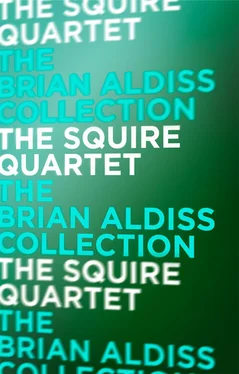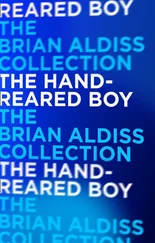(‘Tottering between playing the common man and the intellectual, hopelessly fumbling both roles, Thomas Squire – even now no doubt expecting a knighthood for his services to a TV-zapped nation – tries to camouflage a lack of content beneath a middlebrow concern with the surface of trivia; his compulsive dashes about the globe, which reduce all space and time to a corner of the studio, are physical analogues of his efforts to cover dozens of subjects in order to conceal the fact that he has no subject. As he points in astonishment at things with which we are all too familiar, it is impossible not to feel that the new Renaissance on which he lavishes his laboured epigrams is our Untergang in thirteen episodes.’ Leslie Lippard-Milne, ‘Frankensquire Among the Parts’, New Statesman)
There were no Lippard-Milnes in Ermalpa. The conference paid him homage – although one accepted that homage never meant what it professed. But the delegates were also busy destroying the things he held dear, the things they held dear. Could poor Krawstadt ever enjoy a game of pinball now he had written so villainously on the subject? Well, perhaps one hoped not.
These unembarrassed arts, why should they wilt so easily beneath scrutiny? Another law was emerging. Pick a flower and it dies.
What was he going to do next? How was the rest of his life to be lived? He thought of the sailing ship moored at the harbour, ready to slip away to sea. There was no escape, only the appearance of escape. That depended who else was in the boat with him. The opportunity to begin again often presented itself, no doubt of that. But the blowfly in the human heart ensured that one went on making the old mistakes.
He had no complaints. Things were as they were. If the conference was a failure, he was not responsible; he would never be one to admit it failed. If ideology killed it, there again he had no complaint. In his time – it was curious to look back on it now – he had killed for the sake of ideology. He could remember the savage triumph he felt when, in a farmhouse in Istra, he looked down at the broken body of Slatko, the Russian colonel. That had been no timeless moment of vision; whenever the episode rose to mind, he pushed it from him, not wishing to recognize any more that part of himself.
Now Slatko’s brutal face pursued him. Squire sat up and put the light on, feeling ill.
He padded over to the bathroom to get himself a sip of water – he had been warned that Ermalpa water was contaminated, but he had heard similar tales wherever he went. He caught sight of the unopened envelope lying on the table. After drinking, he took the envelope back to bed and ripped it open.
Inside was one sheet of paper with the hotel’s crest. The letter read,
Dear Tom,
For reasons you know well, I can bear no more of the talk round the conference table. Let me get away just in the morning. You must come with me and pay. We can take a No 9 bus to the little town called Nontreale. It is a cheap fare but you know our government keeps us poor as saints – which we otherwise are not – when we are out of our country. Besides, you are rich.
Tell nobody our plan. I must not tell my ‘comrade’ Kchevov. We will play truant, and talk like men, and view Nontreale cathedral to educate you and make me thirsty.
The bus leaves at 9.05 in the morning. Meet me just outside the hotel at ten minutes to nine tomorrow and I will take you to the bus stop. Nobody shall know where we go, so please be safe and flush this sheet in your toilet bowl (we Russians have a passionate admiration for secrets, you know that). I trust you.
Yours
Vasili Rugorsky
Squire laughed. He laid the letter by his bed, switched off the light, and in a moment was sound asleep, worries forgotten.
The No 9 bus was crowded, but they managed to sit together. Rugorsky’s mood was somewhat withdrawn. He had missed his breakfast in order to get away from the hotel without questioning.
‘I am a man who likes much to eat. But more I like to see foreign countries. When shall I again be allowed outside the sacred frontiers of my own country? It is naturally cosy in there, because it is so well guarded. But I feel a necessity to store up some images of Sicily, other than that room of mirrors and electronic equipment in which we sit.’
He lapsed into silence. Both men sat staring out of the windows as the bus wound through the suburbs of Ermalpa with many a stop, a pachyderm surrounded by flocks of Fiats.
On the outskirts of town, the buildings became drab and decrepit. Squire was reminded of the older parts of Cairo. Coppersmiths and saddlers and vulcanizers worked in tiny open-fronted shops beneath the room in which they and their families lived. The bus had transported its passengers from a twentieth-century city to some outlying byway of history. People, animals, and scruffy fowls were everywhere. Piles of refuse filled yards and gardens, spilling into the street. Here and there an elderly tree defied its destiny by sending forth bright blossom, carmine on purple.
Squire made an idle remark about the filth.
‘No, you see, you are a man of the world,’ said Rugorsky, looking at him askance in his teasing way. ‘But your world is limited. Here it is no real filth. It is merely untidy. That’s all. Merely a little untidy.’
He sank into silence again.
Outside the city, the bus turned onto a good dusty road and began forging steadily west. The way wound upwards, yielding increasingly fine views of the Mediterranean. At every broken-walled village en route, the bus stopped, and women and goats ceased their activities to stare at it.
Half-an-hour later, they arrived in Nontreale. The bus nosed along narrow streets hardly wider than the vehicle, entered the main square, and stopped with a protracted sigh. All the passengers climbed out.
The air was cooler than it had been in Ermalpa. Squire and Rugorsky stood together while the latter wiped his brow thoroughly with a brown handkerchief.
Nontreale held two points of historical and aesthetic interest, a ruinous castle and a cathedral. The cathedral filled one side of the small square. As they stood looking across at it, the crowd generated by the arrival of the bus slowly disappeared. Most of the people appeared to be locals; it was early as yet for tourists. In front of the cathedral, shopkeepers were setting up stalls loaded with bright tourist goods.
Rugorsky nodded and grunted. ‘Byzantium. A common heritage of East and West, you see. It looks promising, Tom. Perhaps we shall enjoy it more for having an ice cream first.’
‘There’s a bar over there. Would you prefer a drink?’
‘I don’t wish for a bad reputation. Let us proceed first to an ice cream.’
They sat down at open-air tables to one side of the square, and the sun shone on them. Rugorsky asked, ‘You don’t mind to pay for me?’
‘I’m pleased to do so.’
‘It does not make you feel too superior to me?’
Squire laughed. ‘You are not the sort of man one easily feels superior to, Vasili.’
‘That’s good – but be careful. I am aware of the terrible sinful power of money. Well aware. Money is very corrupting.’
‘So people say. The lack of it corrupts, too.’
They ordered cassati from the waiter.
Rugorsky reopened the subject. ‘You perhaps assume that as a good socialist I naturally preach about the evils of money. But that is not all my meaning. You see, I also feel on the personal level, and not just as a theory, that money corrupts. It has corrupted me. I am a corrupt man, Tom. Very corrupt, unfortunately. It’s not my wish.’
‘I don’t see you like that.’
An impatient gesture, made slowly to remove any offence. ‘You do not know me. You see, Tom, I do not wish to argue about how corrupt I am. That a man must decide for himself. The scale in such judgements is merely internal. You agree?’
Читать дальше












